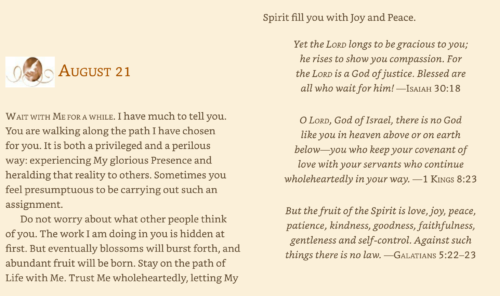Divine Love Restores
Father Richard Rohr is convinced that God’s justice in the Bible is fundamentally loving and restorative rather than punitive.
As we read the Bible, God does not change as much as our knowledge of God evolves. I certainly recognize there are many biblical passages that present God as punitive and retributive, but we must stay with the text—and observe how we gradually let God grow up. Focusing on divine retribution leads to an ego-satisfying and eventually unworkable image of God which situates us inside of a very unsafe and dangerous universe. Both Jesus and Paul observed the human tendency toward retribution and spoke strongly about the limitations of the law.
The biblical notion of justice, beginning in the Hebrew Scriptures with the Jewish prophets—especially Moses, Isaiah, Jeremiah, Ezekiel, and Hosea—is quite different. If we read carefully and honestly, we will see that God’s justice is restorative. In each case, after the prophet chastises the Israelites for their transgressions against YHWH, the prophet continues by saying, in effect, “And here’s what YHWH will do for you: God will now love you more than ever! God will love you into wholeness. God will pour upon you a gratuitous, unbelievable, unaccountable, irrefutable love that you will finally be unable to resist.”
God “punishes” us by loving us more! How else could divine love be supreme and victorious? Check out this theme for yourself: Read passages such as Isaiah 29:13–24, Hosea 6:1–6, Ezekiel 16 (especially verses 59–63), and so many of the Psalms. God’s justice is fully successful when God can legitimate and validate human beings in their original and total identity! God wins by making sure we win—just as any loving human parent does.
Love is the only thing that transforms the human heart. In the Gospels, we see Jesus fully revealing this divine wisdom. Love takes the shape and symbolism of healing and radical forgiveness—which is just about all that Jesus does. Jesus, who represents God, usually transforms people at the moments when they most hate themselves, when they most feel shame or guilt, or want to punish themselves. Look at Jesus’ interaction with the tax collector Zacchaeus (Luke 19:1–10). He doesn’t belittle or punish Zacchaeus; instead, Jesus goes to his home, shares a meal with him, and treats him like a friend. Zacchaeus’ heart is opened and transformed. Only then does Zacchaeus commit to making reparations for the harm he has done.
As Isaiah says of God, “My thoughts are not your thoughts, nor are your ways my ways” (Isaiah 55:8). Yet I am afraid we largely pulled God down into “our thoughts.” We think fear, anger, divine intimidation, threat, and punishment are going to lead people to love. We cannot lead people to the highest level of motivation by teaching them the lowest. God always and forever models the highest, and our task is merely to “imitate God” (Ephesians 5:1).
Jesus’ Work of Shalom
Author and activist Shane Claiborne connects biblical justice with righteousness:
The word “justice” gets abused and misused. People demand “justice” all the time but have very different things in mind as they call for it. It has been so misrepresented that justice itself might do well to find some new lawyers; it needs better representation.
For starters, the word for “justice” in the Bible is the same word as “righteousness.” This overlap shows that the central concern of biblical justice was not “getting what you deserve”; rather, it was making right what was done wrong, restoring what had been destroyed, healing the wounds of an offensive act. It was about bringing balance and wholeness back to the community, which is why you often see scales as an icon for justice.
But the scales can be misleading, since it is not just about balance or even “eye for an eye” justice. Real justice goes much deeper. One of my friends who is a biblical scholar says the best contemporary translation for the ancient notion of “justice/righteousness” is “restorative justice.” [1]
Sister Mary Katherine Birge offers examples of ways Jesus enacted restorative justice:
The kingdom of God that Jesus taught, preached, and enacted during his ministry … begins from a conviction that God’s deepest hope for humanity—that we live with God and with one another in relationships that are just—is possible.…
Jesus lives, teaches, preaches, and demonstrates to all who are willing to listen to him this same kingdom of God, the image of shalom [wholeness, harmony, and peace]. He makes the kingdom of God present every time he performs a miracle of healing (see Mark 1:29–31), drives out evil spirits from someone they possess (see Matthew 9:32–34), and brings back to this life a person who has died (Mark 5:21–24, 35–43; Luke 7:11–17; John 11:1–44). Through his own hospitality and openness to the alien and the enemy … [and] to those who would put him to death …, [Jesus] makes it possible for others to join him in building the kingdom of God, building shalom, in the present age.…
This is the task of those who would follow Jesus: to live in just relationships with one another, to work at restoring to wholeness those people and relationships that they and others have broken, and to repair as best they can what cannot be restored. This practice of restoring and repairing relationships between people and God and among people themselves is not unlike that in which the contemporary practice of restorative justice engages. Like Jesus’ own work … to bring about the fullness of shalom, through the practice of right relationships and the healing of those people who are “broken,” restorative justice focuses on the present and future needs of the victim, the perpetrator, and society in order to repair what has been broken or stolen from the victim, to bring the perpetrator to acceptance of responsibility, and to mend the threads that hold society together. [2]
